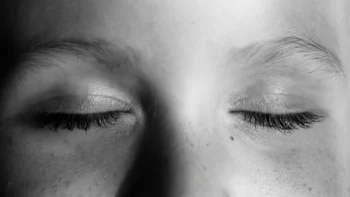You’ve just woken up, and are beginning your morning routine, when your partner walks into the washroom and gives you a bit of a funny look. They make a remark about your eyes looking a little yellow. You pause for a moment, wondering if it’s just the light, before taking a second glance to confirm. The first question that may come up for you is, “I have yellow eyes, meaning what?” followed closely by, “what causes yellow eyes?” which is exactly what we’re going to cover. Let’s dive in and take a look at 9 of the top causes of yellow eyes and the health implications it has on your well-being.
The Meaning of Yellow Eyes: What It Is & How It Differs From Jaundice
When the whites of your eyes begin to turn yellow, this is known as scleral icterus, a condition that often precedes the development of jaundice in the body. While scleral icterus is characterized by the same “yellowing” discoloration as seen in jaundice, it differs in that only the eyes are affected, and not the skin. It is common for both of these terms to be used interchangeably with one another due to their similar symptoms, causes, and treatments, despite being two separate conditions.
What Causes Yellow Eyes: Bilirubin Buildup
Your body breaks down red blood cells as part of a natural process called erythropoiesis. This breakdown is to ensure that your body has enough hemoglobin, an iron-containing protein that carries oxygen from your lungs to the rest of your body. As a by-product of the erythropoiesis cycle, small amounts of bilirubin (an orange-yellow substance) are released during the breakdown process. Usually, this bilirubin is quickly processed through the liver and eliminated from the body without any issue. However, if something disrupts this natural cycle, then bilirubin accumulates in your tissues and is what causes yellow eyes. The most common underlying medical conditions that cause yellowing eyes are associated with the liver, but we’ll get to those down below. It is critical to see a doctor immediately for a proper diagnosis and treatment if you notice your eyes yellowing.
9 Of The Top Medical Conditions With Yellow Eyes As Symptoms
If you’re noticing a yellow tinge to your eyes, it could be a symptom of any one of the following 9 medical conditions.
1. Viral Hepatitis: is a medical condition caused by any one of several viruses, which interfere with the body’s ability to process bilirubin and leads to inflammation of the liver. The viruses that cause viral hepatitis can be contracted through contaminated food or water when traveling, or through sexual contact or sharing needles with an infected person. In some cases, severe viral hepatitis may even lead to liver failure. The symptoms of this can range from mild to severe and can include fatigue and weakness, itchy skin, nausea and vomiting, fever, problems with blood clotting, and yellowing of the eyes and skin.
2. Cirrhosis: with cirrhosis of the liver, the liver becomes scarred and hardened due to long-term damage caused by various diseases and conditions, such as alcohol abuse, viral hepatitis, or fatty liver disease. The scarring caused by cirrhosis makes it difficult for the liver to carry out its normal functions, such as filtering toxins from the body and producing bile to digest food.
The symptoms of cirrhosis can include fatigue, appetite loss, jaundice/yellowing of eyes, weight loss, confusion, abdominal pain, itching, and easy bruising or bleeding. In some cases, cirrhosis may lead to complications such as ascites (fluid buildup in the abdomen), portal hypertension (abnormally high blood pressure in the portal vein), or hepatic encephalopathy (increased levels of toxins in the brain).
3. Anemia: with anemia, the body does not produce enough healthy red blood cells. Since your red blood cells carry oxygen throughout your body, not having enough can lead to symptoms of fatigue, headaches, pale skin, and shortness of breath. Anemia can be caused by a medical condition that destroys red blood cells, or conditions like chronic inflammation, cancer, iron or vitamin B12 deficiencies. Treatments for anemia may include iron supplements, vitamin B12 injections or other medications depending on the cause.
4. Broken Blood Vessel (Eye): subconjunctival hemorrhage is a condition in which small blood vessels break and bleed into the area beneath the conjunctiva; the thin, transparent tissue that covers the white of the eye. This can cause a bright red or pink patch to appear on the sclera (white part of the eye), which eventually turns yellow as the blood cells get broken down. Though subconjunctival hemorrhage can be startling, it is usually harmless and does not require treatment. In some cases, subconjunctival hemorrhage can be caused by trauma or an injury to the eye, so it is important to consult with an ophthalmologist if you have any concerns about your vision.
5. Blocked Bile Duct: blocked bile ducts can cause the eyes to appear yellow due to the build-up of bilirubin in the bloodstream. In healthy individuals, bile passes through the common bile duct into the small intestine, where it helps with digestion. If this duct becomes blocked, however, bile builds up in the liver and bloodstream, and is what causes yellow eyes. Culprits of a blocked bile duct include gallstones, tumors, cysts, or infections like viral hepatitis. Treatment for a blocked bile duct typically requires surgery or other procedures to open up and restore normal flow of bile from the liver.
6. Over-doing Certain Medications: taking medications such as acetaminophen (Tylenol), ibuprofen (Advil), or aspirin for prolonged periods of time can lead to the yellowing of the eyes.
7. Neonatal Jaundice: neonatal jaundice is a common condition in which a newborn baby’s skin and whites of the eyes appear yellowish due to an increased level of bilirubin in their blood. This condition affects up to 80% of all newborns, typically appearing when a baby is one to three days old, as their liver cannot remove it fast enough. Causes of neonatal jaundice can include preterm birth, immature liver function, or certain blood types. Treatment for neonatal jaundice usually involves phototherapy, where the infant is placed under special lights that help break down bilirubin in the baby’s bloodstream. In some cases, a blood transfusion may be required, so it is important to consult with your doctor if you have any concerns about your baby’s health.
8. Pancreatic Cancer: jaundice is often one first sign of pancreatic cancer that people notice, and can be an indication that a tumor has grown large enough to block the common bile duct. The blockage in the bile duct prevents bile from leaving the liver and causes its accumulation in the blood. Other symptoms associated with pancreatic cancer include abdominal pain, weight loss, and fatigue. With pancreatic cancer, early detection and proper diagnosis are key for successful treatment plans, which typically include surgery, chemotherapy or radiation therapy.
9. Sarcoidosis: is an autoimmune disorder that develops when granulomas (inflammatory cells) collect in the body’s tissues and organs. The most common places for these granulomas are in the lymph nodes and lungs, but they can affect both the eye and the eye’s conjunctiva. If ocular sarcoidosis is suspected, further diagnosis may include imaging tests such as ultrasound or CT scan to assess any changes present in the eyes. People who have the condition are more likely to experience uveitis, a form of eye inflammation which can cause permanent vision loss if left untreated. The cause of sarcoidosis is unknown, but experts suggest it could be due to genetic factors or environmental factors such as bacteria, dust, viruses or chemicals. Treatment depends on how advanced it is, but may involve medications or immunosuppressive therapy to reduce inflammation and prevent further damage.
When to See an Ophthalmologist at Brimhall Eye in Las Vegas?
If you notice that only one eye is turning yellow, and do not have any other symptoms like a high fever, abdominal pain, weakness, fatigue, moderate nausea/vomiting, or shortness of breath, and believe that the yellowing is associated with an underlying condition specific to your eyes, then we recommend booking an appointment with us. Our team of experts in Las Vegas can run you through a comprehensive eye exam, provide professional opinion on treatment, and recommend you for additional testing types if we believe that prompt medical care is required.





